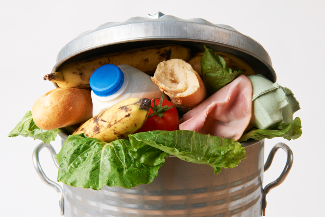Member State Page : Portugal
Last updated on the 29/09/2023

In total: 1.9 million tonnes in 2020
In total: 1.9 million tonnes in 2021

Retail and other distribution of food: 214 233 tonnes in 2020
Restaurants and food services: 237 486 tonnes in 2020
Households: 1.3 million tonnes in 2020

Target
Portugal is committed to meeting the Sustainable Development Goal Target 12.3 to halve per capita food waste at the retail and consumer level by 2030, and reduce food losses along the food production and supply chains, as part of its national strategy and action plan to combat food waste.
Measure
The National Institute for Statistics (INE) in Portugal is tasked with monitoring food waste levels and is a member of the CNCDA. The institution is working with stakeholders across the food supply chain to measure food waste levels at each stage of the chain (primary production, processing and manufacturing, retail and other forms of food distribution, restaurants and food services, households).
From a methodological point of view, in the absence of previous systematic data collection on food waste levels, there is an effort to validate the results through proxies and the adoption of case studies to support the quantification methodology in some of the segments of the food supply chain. The data will be available by June 2022.
Under the national strategy against food waste, INE is responsible for regularly publishing a statistical panel of food waste levels, including the creation of an area dedicated to this topic on the official statistics website.
Act
Portugal has a national strategy and action plan to combat food waste, approved by Ministerial Order 46/2018. The strategy was developed by the CNCDA, which includes key public authorities from the national and local governments, as well as a social solidarity association. The CNCDA has established an advisory panel with representatives of the whole food supply chain, as well as from research, academia, and non-governmental organisations, in order to receive advice on food waste related matters. CNCDA’s targets include:
- Diagnosis, evaluation and monitoring of food waste in Portugal;
- Identification of good practices;
- Systematisation of food waste measurement indicators;
- Involvement of civil society;
- The development of an electronic platform for managing food products at risk of being wasted;
- Proposal of measures to reduce food waste.
The national strategy follows a vision of ‘sustainable production for responsible consumption’, having three major strategic objectives: to prevent, to reduce and to monitor food waste. The strategy is harmonised with the national plan for circular economy, which references the Sustainable Development Goal Target 12.3 to halve per capita food waste and reduce food losses along the whole food supply chain, by 2030.
The national strategy is supported by 9 operational objectives:
- Raising awareness;
- Prevention trainings in schools;
- Promoting professional training for agents and food business operators;
- Proactive reporting policy;
- Innovating and fostering good practices;
- Reducing administrative barriers;
- Strengthening cooperation between actors;
- Implementing a measurement system and a reporting system at different stages of the food supply chain.
The action plan to combat food waste which accompanies the national strategy includes 14 measures, which intend to respond to the main issues identified in the diagnosis that preceded the national strategy (e.g. to clarify the meaning of date marking, to promote food redistribution, to monitor food waste levels etc.).
As part of the national strategy, the CNCDA established a voluntary agreement with the retail sector for the creation of specific points for selling products at risk of being wasted and carries out public awareness campaigns for consumers to clarify the meaning of date marking. Prior to the creation of the national strategy, civil society associations have established several voluntary agreements with the retail sector in order to rescue surplus food for food donation. In Portugal, donors can deduct up to 140% of the value of the food at the time of donation (limited to 8/1000 of the donor’s turnover) if the food is used for a social purpose. There are also fiscal benefits in place in the form of corporate tax reductions for food donation.
The Portuguese Federation of Food Banks (FPBA) has agreements with charitable organizations in order to redistribute surplus food and, together with CNCDA and other entities, has established the United Against Waste alliance (Unidos contra o Desperdício), which aims to encourage and facilitate the donation of surplus food, while also promoting responsible consumption.
Under the same strategy, the Portuguese Retailers Association launched a national campaign in supermarkets to educate consumers about the difference between ‘use by’ and ‘best before’ date markings and to clarify that foodstuffs with a date of minimum durability (‘best before’) can still be consumed after this date.
People in need, beneficiaries of food baskets under the EU Fund for European Aid the Most Deprived Operational Programme (FEAD) received information materials ‘Smart food: eat better, save more’ on how to best use and manage the food products.
The Economic and Food Safety Authority (ASAE) and the General Directorate of Food and Veterinary (DGAV), as well as some local administrations, support food redistribution organisations and their partners by providing information and trainings on aspects related to food hygiene and food security, as well as by identifying barriers to food donation.
Developing and promoting consumer awareness actions is a responsibility of the General Directorate for Consumers (DGC) and other partner entities. Such campaigns, including national campaigns on topics related to food waste, (e.g. to clarify the meaning of date marking), have been promoted together with national authorities in charge of food safety and animal health.
Under the national strategy, schools are required to develop awareness raising activities about the issue of food waste. The action is led by the Directorate-General of Education, who is part of the CNCDA. Almost half of the school canteens and cafeterias in Portugal have carried out activities such as food redistribution, monitoring food waste levels, awareness raising actions on the impacts of food waste and against plate leftovers.
CNCDA’s website and its newsletter promote and disseminate best practices in food loss and waste prevention, including information on new developments in this area. The website also includes reports about work carried out by CNCDA and at EU level, as well as other publications related to food waste.
The CNCDA launched a label for sustainable production and responsible consumption aiming to enhance the visibility of both public and private food chain operators that develop initiatives related to food waste prevention and measurement, within the framework of their activities.
The Ministry of Economy promotes research, development and innovation in food waste prevention, encouraging the exchange of experience among food business operators (including Small and Medium-sized Enterprises) and working with the main stakeholders’ associations to find solutions to the issue. The Agency for Competitiveness and Innovation (IAPMEI) organized webinars for food business operators to raise awareness concerning food waste and innovative solutions to combat it. The CNCDA also holds seminars to discuss aspects related to food waste (taxation, date marking or donation circuits) with different actors (public institutions, private stakeholders and their associations, NGOs) in order to explore alternative views and to find the best solutions for the identified issues.
Relevant resources
Links
